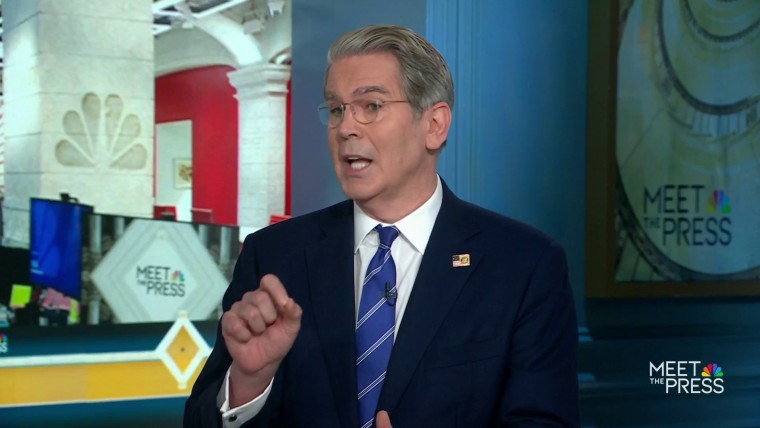Treasury Secretary Scott Bessent signaled Sunday that the U.S. is open to partnering with European countries to impose more sanctions on countries that buy Russian oil in an attempt to “collapse” the Russian economy and brushed aside concerns that the U.S. was entering a recession.
“We are prepared to increase pressure on Russia, but we need our European partners to follow us,” Bessent said on NBC News’ “Meet the Press.”
“We are in a race now between how long can the Ukrainian military hold up versus how long can the Russian economy hold up,” Bessent added. “And if the U.S. and the [European Union] can come in, do more sanctions, secondary tariffs on the countries that buy Russian oil, the Russian economy will be in total collapse, and that will bring [Russian] President [Vladimir] Putin to the table.”
Last month, the Trump administration imposed 50% tariffs on India, some of the highest tariffs the U.S. has imposed on any nation, citing its continued purchases of Russian oil amid the war in Ukraine.
Russia launched its largest air attack of the war overnight, killing at least four people and setting fire to a government building in Kyiv.
Also Sunday, Ukrainian President Volodymyr Zelenskyy said on ABC News’ “This Week” that putting tariffs on countries that continue to make deals with Russia is the “right idea.” He also said he thinks “President Trump is right” about his criticism of European countries that still buy Russian oil.
“I’m very thankful to all the partners, but some of them, I mean, they continue [to] buy oil and Russian gas, and this is not fair,” Zelenskyy said.
“I think, what I think, I think the idea to put tariffs on the countries who continue make deals with Russia. I think this is right idea,” he added later.
Trump flew to Alaska last month to meet with Putin for the first time in his second term. Days later, Trump hosted Zelenskyy and European leaders at the White House to discuss a potential end to the war.
Since then, it appears that talks of a ceasefire or an end to the war have stalled, and Russia has continued its onslaught of airstrikes on Ukraine.
Last week, NBC News reported that Trump has grown pessimistic about efforts to end the war, though he joined European leaders on phone calls and urged them to join the U.S. in putting pressure on China for supporting Russia’s war effort.
Bessent also spoke about Trump’s economic agenda, dismissing concerns about tariffs and last week’s August jobs report. He also dismissed concerns that it was a sign of a “jobs recession” in the U.S.
Bessent also spoke Sunday about the Trump administration’s appeal to the Supreme Court seeking to overturn an appeals court decision that ruled against Trump’s far-reaching tariffs.
“I am confident that we will win at the Supreme Court,” he told “Meet the Press” moderator Kristen Welker.
He added, however, that if the Supreme Court rules against Trump, “there are numerous other avenues that we can take” to continue to impose tariffs.
But those other avenues, Bessent added, would “diminish President Trump’s negotiating position.”
In a ruling signed by seven of its judges, the U.S. Court of Appeals for the Federal Circuit said Trump misused his authority when he imposed tariffs on foreign nations under the guise of the president’s emergency powers. The court said only Congress has the power to impose such sweeping tariffs.
Asked whether the Trump administration would be ready to issue refunds for the tariff revenue it has collected if the Supreme Court ruled against it, Bessent said, “We would have to.”
“We would have to give a refund on about half the tariffs, which would be terrible for the Treasury,” Bessent said, adding later: “If the court says it, we’d have to do it.”
Still, he largely defended Trump’s tariff agenda Sunday, telling Welker earlier in the program that tariffs are not a tax on the American people and pointing to other markers of success in the economy.
“If things are so bad, why was the GDP 3.3%? Why is the stock market at a new high? Because, you know, with President Trump, we care both about big companies and small companies,” he said.
"When I was here in April, the sky was falling with the tariffs, that everyone is leaving the U.S. Since then, the U.S. bond market has been the best-performing bond market in the developed world, and from Barclays Bank to Goldman Sachs to others are saying it is the tariff income and the fiscal improvement that we are seeing,” he added. “That’s what President Trump is talking about.”
Bessent also referred to what he called an economic "panic" in April in responding to last month's jobs report, which showed lower-than-expected growth in the jobs market.
Bessent disputed economic analysts who said the U.S. is in a "jobs recession," pointing to new highs in the stock market as a sign of a healthy economy.
"When I was here with you in April, there was a panic, because the stock market had gone down," he told Welker. "A lot of other mainstream media people were in a complete lather over the stock market performance."
"President Trump ... held the views on tariffs. He was proven right. We had the quickest stock market recovery in history," he added. "We're at new highs in August, and we — look, we're not going to do economic policy off of one number. We believe that good policies are in place that are going to create good, high-paying jobs for the American people."

